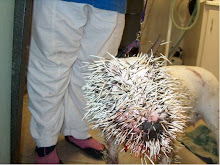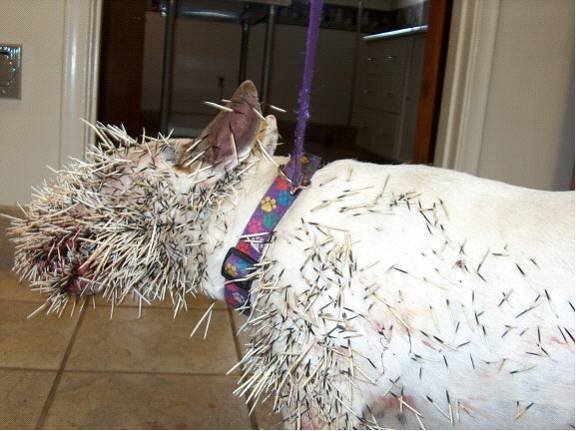Recently I was reading in the "Bark" magazine that the BCSPCA puts out and it was explaining some reasons and facts on animal reproduction.
I particularly like the simple math equation that says :
At two litters a year and six kittens per litter an unspayed cat can produce in seven years....wait for it......420,000 cats!!!
I am all for taking care of your animals and if still undecided there are a few question and answers that the American humane society was very happy to answer:
WHAT IS IT??
Spaying is a general term used to describe the ovariohysterectomy of a female animal. Neutering is a general term used to describe the castration of a male animal. However, neutering is used in reference to both genders. The surgical procedure, performed by a veterinarian, renders the animal incapable of reproducing. Here are answers to some questions you may have about this beneficial procedure.
When can I have this procedure done?
Both procedures can be performed as early as six weeks of age. American Humane is a strong proponet of "early" neutering since this guarantees that the animals will not be able to breed and populate within a community.
Why should I have my pet neutered?
Animal shelters, both public and private, unfortunately are faced with an incredible burden: What to do with the overpopulation of dogs and cats that they cannot find homes for. Estimates across the country indicate that over 10 million animals will be humanely euthanized at shelters each year, due to the sheer fact that there are not enough homes. Having your pet neutered ensures that you will not be adding to this tremendous burden.
What are some of the health benefits?
Through neutering, you can help your dog and cat live a happier, healthier, and longer life. Spaying eliminates the constant crying and nervous pacing that is a sign that a cat is in heat. Castration stops the mating drive in males, reducing the urge to roam, which in turn, reduces the risk of fights, injury, poisoning, accidents, and contracting diseases. If you have more than one pet in your household, all the pets will get along better if they are neutered.
A long-term benefit of neutering is improved health. Early neutering nearly eliminates breast cancer, and totally prevents uterine infections and uterine and testicular cancer.
Isn't it true that you only need to "fix" female dogs or cats?
Absolutely not! A male animal can father thousands of offspring in his lifetime. Roaming tomcats fighting other cats are a neighborhood nuisance and are prone to develop infections and abscesses from their fighting. An intact male may also develop the bad habit of marking its territory by urine marking.
Neutering just costs too much!
The cost of caring for a pet, including providing veterinary care, should be considered before acquiring an animal. If you would like to provide a good home for a pet, but cannot pay for the neuter, call your local animal shelter. They will be happy to provide information on low-cost neutering. The costs of having a litter are often more than the cost of neutering. There could be complications requiring hospitalization or surgery. You will be faced with finding homes or keeping the offspring yourself or placing more animals into your local shelter. The cost of the well-being of not just your companion animal but of future generations should be considered.
Can't I allow my purebred dog to have just one litter?
Mixed breed or purebred -- there just aren't enough homes. Animal shelters receive purebred animals everyday. Responsible purebred breeders have homes for their dogs before they are born.
I don't even own a pet! Why is this my problem?
All of us are affected by animal overpopulation. Millions of tax dollars are spent annually to round up lost, abandoned, and unwanted pets. Much of that money is spent to destroy these animals when homes cannot be found. Health is threatened by the danger of transmittable diseases, including rabies, animal bites, and attacks. Property may be damaged and livestock killed when pets roam in search of food. Animal waste, proving a serious environment hazard, foul yards and parks. It is only when all of us assume the responsibility for pet overpopulation that we will see any decrease in the problem.
Isn't it wrong to deprive an animal of the natural right to reproduce?
No, it's wrong to allow these animals to reproduce millions of unwanted offspring that are eventually killed because there aren't enough responsible homes.
If I find homes for my pets' litters then I won't contribute to the problem, right?
Wrong. Only a certain number of people want pets. So every home you find for your pet's offspring takes away a home from a loving animal already at a shelter.
Shouldn't every female pet have at least one litter before being spayed?
No. In fact, your pet will be healthier if she never sexually matures. Her personality will not improve either. She is just as likely to become less social and more aggressive after having a litter, as she is to become calmer and gentler.
Shouldn't children experience the miracle of birth?
No. A more important lesson to teach your child would be responsible pet ownership and concern for life by explaining why their pet should not have babies.
Doesn't neutering alter an animal's personality?
No. Personality changes that may result from neutering are for the better. Not being distracted by the instinctual need to find a mate helps your pet stop roaming and become calmer; though not less protective of their territory.
Won't animal shelters take care of the surplus animals?
No. Shelters do their best to place animals in loving homes, but the number of homeless animals far exceeds the number of available homes. This leaves many loving and healthy animals in our community that must be euthanized as the only humane solution to this tragic dilemma. Only spaying and neutering can end the overpopulation problem.
I think there are probably many more questions but if in need please feel free to contact your local SPCA.
WOOF!!!!
Subscribe to:
Post Comments (Atom)

































No comments:
Post a Comment